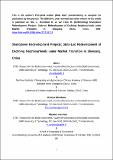Files in this item
Shantytown redevelopment projects : state-led redevelopment of declining neighbourhoods under market transition in Shenyang, China
Item metadata
| dc.contributor.author | Li, Xin | |
| dc.contributor.author | Kleinhans, Reinout | |
| dc.contributor.author | van Ham, Maarten | |
| dc.date.accessioned | 2019-03-31T00:45:20Z | |
| dc.date.available | 2019-03-31T00:45:20Z | |
| dc.date.issued | 2018-03 | |
| dc.identifier | 251464448 | |
| dc.identifier | 5065796e-ed87-46b5-9271-2ae535667244 | |
| dc.identifier | 85033667288 | |
| dc.identifier | 000425205600011 | |
| dc.identifier.citation | Li , X , Kleinhans , R & van Ham , M 2018 , ' Shantytown redevelopment projects : state-led redevelopment of declining neighbourhoods under market transition in Shenyang, China ' , Cities , vol. 73 , pp. 106-116 . https://doi.org/10.1016/j.cities.2017.10.016 | en |
| dc.identifier.issn | 0264-2751 | |
| dc.identifier.other | RIS: urn:A462DFBF90C3B905B780D4799139A722 | |
| dc.identifier.other | ORCID: /0000-0002-2106-0702/work/64697531 | |
| dc.identifier.uri | https://hdl.handle.net/10023/17404 | |
| dc.description | The research leading to these results has received supports from the following funding: National Natural Sciences Foundation of China (Ref: 41571152; 41201160), National Social Science Found of China (Ref: 13BJY067), and the China Scholarship Council (CSC). | en |
| dc.description.abstract | Since 1978, market transition in China has significantly influenced the roles of the state, the market and the residents in urban restructuring. Since 2008, the central government has initiated Shantytown Redevelopment Projects (SRPs) to improve the living conditions of low-income residents. Between 2008 and 2012, about 12.6 million households were involved in SRPs, and forced to move as their dwellings were demolished. This paper investigates how SRPs are implemented by revealing how different stakeholders interact in SRPs in the city of Shenyang, China. Through in-depth interviews with various stakeholders and analysis of policy documentation on SRPs, the paper reveals a complex interplay between different stakeholders, which is characterized by the centralization of the inception of SRPs, the decentralization of actual SRP implementation, changes in the role of market forces, and decreasing housing affordability and multiple deprivation of residents in SRP target areas. Various stakeholders have consensus on the need for improving the living conditions in deprived neighbourhoods and on boosting the housing market. However, conflicts arise due to frictions between the central and local governments regarding the implementation of SRPs. We also find evidence of an entrepreneurial paradox in the relationship between local governments and developers. Finally, a mismatch occurs between the scope of the SRP policy and residents' attempts to improve their socioeconomic situation. | |
| dc.format.extent | 952183 | |
| dc.language.iso | eng | |
| dc.relation.ispartof | Cities | en |
| dc.subject | Shantytown redevelopment | en |
| dc.subject | Declining neighbourhoods | en |
| dc.subject | Market transition | en |
| dc.subject | Governance | en |
| dc.subject | Demolition | en |
| dc.subject | China | en |
| dc.subject | G Geography (General) | en |
| dc.subject | H Social Sciences (General) | en |
| dc.subject | HC Economic History and Conditions | en |
| dc.subject | NDAS | en |
| dc.subject | SDG 11 - Sustainable Cities and Communities | en |
| dc.subject.lcc | G1 | en |
| dc.subject.lcc | H1 | en |
| dc.subject.lcc | HC | en |
| dc.title | Shantytown redevelopment projects : state-led redevelopment of declining neighbourhoods under market transition in Shenyang, China | en |
| dc.type | Journal article | en |
| dc.contributor.institution | University of St Andrews. School of Geography & Sustainable Development | en |
| dc.identifier.doi | 10.1016/j.cities.2017.10.016 | |
| dc.description.status | Peer reviewed | en |
| dc.date.embargoedUntil | 2019-04-01 |
This item appears in the following Collection(s)
Items in the St Andrews Research Repository are protected by copyright, with all rights reserved, unless otherwise indicated.

